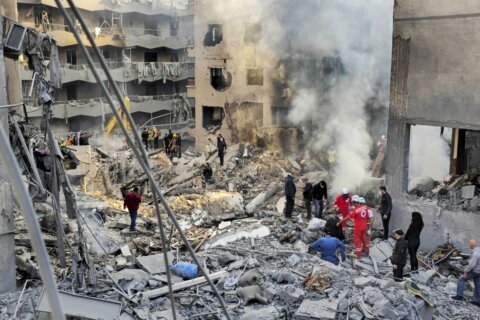BOGOTA, Colombia (AP) — Colombia’s government and the nation’s largest remaining guerrilla group have extended by six months a ceasefire that began last year, with the National Liberation Army rebels also promising to stop kidnapping civilians for ransom.
The truce was set to expire on Tuesday. But in a brief statement issued just minutes before midnight, both sides said that they have extended the cease-fire for 180 days.
The statement says the National Liberation Army, known by its Spanish acronym ELN, will “temporarily and unilaterally suspend economic detentions” in order to contribute to the cease-fire
Later on Tuesday, both sides published a more detailed statement about the ceasefire extension. In it they said they had agreed to create a website about the peace talks and that children under 15 would not be used to conduct intelligence operations or other kinds of military activities.
Government officials said they were pleased with the new terms of the cease-fire.
“Many of the peace deals that have been signed in this country have had little impact on the ground,” Otty Patiño, Colombia’s peace commissioner, told local radio station Blu. “It is very important to work on territorial peace.”
Colombia’s government and the ELN have been holding peace talks since late 2022 as President Gustavo Petro tries to pacify several armed groups that weren’t part of a 2016 peace deal between the government and the nation’s main rebel group, the Revolutionary Armed Forces of Colombia, or FARC.
A cease-fire between the government and ELN started in August, and has reduced fighting between both sides. But during the truce, the rebels also have been recruiting teenagers, and financing their operations through extorsion and kidnappings, leading to complaints that the cease-fire hasn’t done enough to improve security for civilians in rural areas.
“The ceasefire has reduced the number of battles between the ELN and the government,” said Elizabeth Dickinson, a Colombia analyst for the International Crisis Group. “But violence in Colombia has long come from combats between illegal groups, and from the pressure they exert on civilians.”
In October, the cease-fire almost broke down when an ELN detachment in northern Colombia kidnapped the parents of Luis Díaz, one of the nation’s most beloved soccer players. Díaz’s mother was quickly rescued by police, while his father was released 12 days later following numerous protests and petitions.
The rebel group has been reluctant to disclose how many hostages it is currently holding, though Colombia’s defense ministry has said that the ELN could be holding at least 38 civilians.
The new ceasefire agreement did not specify whether the ELN’s current hostages would be released, sparking complaints from critics of president Petro, who have accused his administration of being too soft on the rebels.
On Tuesday, Jose Jaime Uscategui, a congressman for the conservative Democratic Center Party, tied himself to the front gate of Colombia’s embassy in Cuba, carrying the photos of civilians who are reportedly being held by the ELN.
“The families of these people demand to know what happened to their loved ones,” Uscategui said.
The rebels have asked the government to provide them with alternate ways to finance their operations, while talks continue to take place. The government has denied that request, but on Tuesday agreed to creating a fund through which activities related to the peace talks will be financed, including the delivery of humanitarian aid to areas affected by the conflict and “educational activities” that will inform communities about the peace talks.
The cease-fire statement said that the conditions under which the rebels will cease kidnappings will continue to be discussed in an upcoming round of talks in April.
Copyright © 2024 The Associated Press. All rights reserved. This material may not be published, broadcast, written or redistributed.






